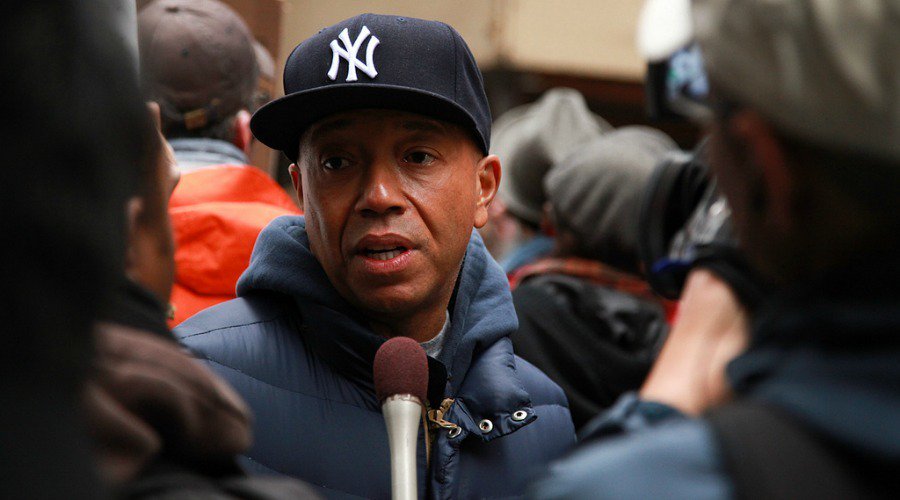Russell Simmons Has Been Accused Of Raping Three Women & Derailing Their Careers In The Music Industry
“I gave up something that I loved to do. I erased myself."
A wide-ranging New York Times article reports that hip-hop mogul and Def Jam co-founder Russell Simmons has been accused of raping three women over the course of several decades. The women, all of whom spoke on the record, range from a pop singer to a Def Jam executive to a music journalist, and all said that the violence and harassment they experienced at the hands of Simmons drove them out of the business. Through his lawyer, Simmons denied each of the allegations.
One of the women is pop singer Tina B (real name Tina Baker), whom Simmons managed in the 1980s. After being invited back to Simmons' apartment in either late 1990 or early 1991, Baker claims Simmons raped her.
Tina B had been singing since she was an infant and formed her first band when she was just 11. She later teamed up with producer Arthur Baker (who she later married and divorced) and made her recording debut contributing to Afrika Bambaataa and the Jazzy Five’s 1981 song “Jazzy Sensation”—the first record ever released on Tommy Boy.
In 1982, as a member of the group Rocker’s Revenge, Tina scored a No. 1 dance hit with a cover of Eddy Grant’s “Walkin’ on Sunshine.” Her 1984 self-titled debut album, which was released on Elektra Records, featured underground dance anthems like “Honey To A Bee.” Tina was also a songwriter who wrote the hit “Not Like Kissing You” for Canadian band West End Girls in 1991.
After the alleged rape incident, Tina remained tied to Simmons contractually, and her attempts to distance herself led her career to flounder, with two years worth of songwriting and recording remaining shelved. “The second he agreed to work with me, my budget increased, the label was paying more attention to me,” she said. After the assault, however, "I went into oblivion.” Baker says the entire ordeal caused her to experience severe depression and she "didn’t have sex with a man for almost nine years.” As she told the Times, after the alleged rape, she “didn’t sing for almost a year.”
Each story stands as an example of a talented woman being driven out of the music industry because of alleged sexual violence.
Another woman who accused Simmons of rape is Drew Dixon, the daughter of former Washington D.C. Mayor Sharon Pratt, who worked as an A&R at Def Jam under Simmons in the mid-1990s. She had an ear for talent, bringing a young Notorious B.I.G. to the Def Jam office and A&R'ing Method Man and Mary J. Blige’s hip-hop classic “You’re All I Need.” She had breakthrough success with the soundtrack to the music documentary The Show, which went Platinum and featured contributions from 2Pac, Snoop Dogg, Dr. Dre, and more. Both she and Simmons were executive producers on the project.
According to Dixon, Simmons frequently sexually harassed her at work. “[Resisting him] was a full-time job,” she said. “It was exhausting. It was like making a record while swimming in rough seas.” She claims that he raped her after a work party in 1995, and she resigned from Def Jam soon after.
Dixon began to work at Arista under Clive Davis, where she oversaw hit records like Whitney Houston’s “My Love Is Your Love,” Aretha Franklin’s “A Rose Is Still a Rose,” and Santana’s “Maria Maria.” She also worked on Monica’s sophomore album The Boy Is Mine and Q-Tip’s 1999 solo debut Amplified, among other projects. Once L.A. Reid took over, however, she claims he began to harass her as well, ultimately driving her from the music industry altogether. “I gave up something that I loved to do,” she said. “I erased myself. I want people to know why.”
Dixon also claimed Simmons apologized to her years later, admitting he was wrong and saying, “I have daughters and I do yoga now.”
The earliest alleged incident took place in 1988. Around that time, Simmons briefly dated Toni Sallie, a journalist for Black Radio Excellence; they broke things off after a few dates, but remained cordial. Later, according to Sallie, Simmons raped her at apartment in 1988. She didn’t want to report the incident to the police because she was afraid of the professional consequences for her career. “You have to understand, I was very much in a man’s game,” she said. “Black women were just starting to break into the field.”
Simmons has denied each of these allegations in a lengthy statement to The New York Times, saying they have “shocked me to my core and all of my relations have been consensual.”
Whether they were a recording artist like Tina B, a label A&R like Drew Dixon, or a young writer like Toni Sallie, each woman’s career ended due to exploitation by the very person they hoped would help them achieve their dreams in the industry. Each story stands as an example of a talented woman being driven out of the music industry because of alleged sexual violence. All of their stories highlight the longterm effects of sexual harassment on not just the women, but the quality of music itself.
Hi! I am a robot. I just upvoted you! I found similar content that readers might be interested in:
https://genius.com/a/russell-simmons-has-been-accused-of-raping-three-women-derailing-their-careers-in-the-music-industry
Thank you